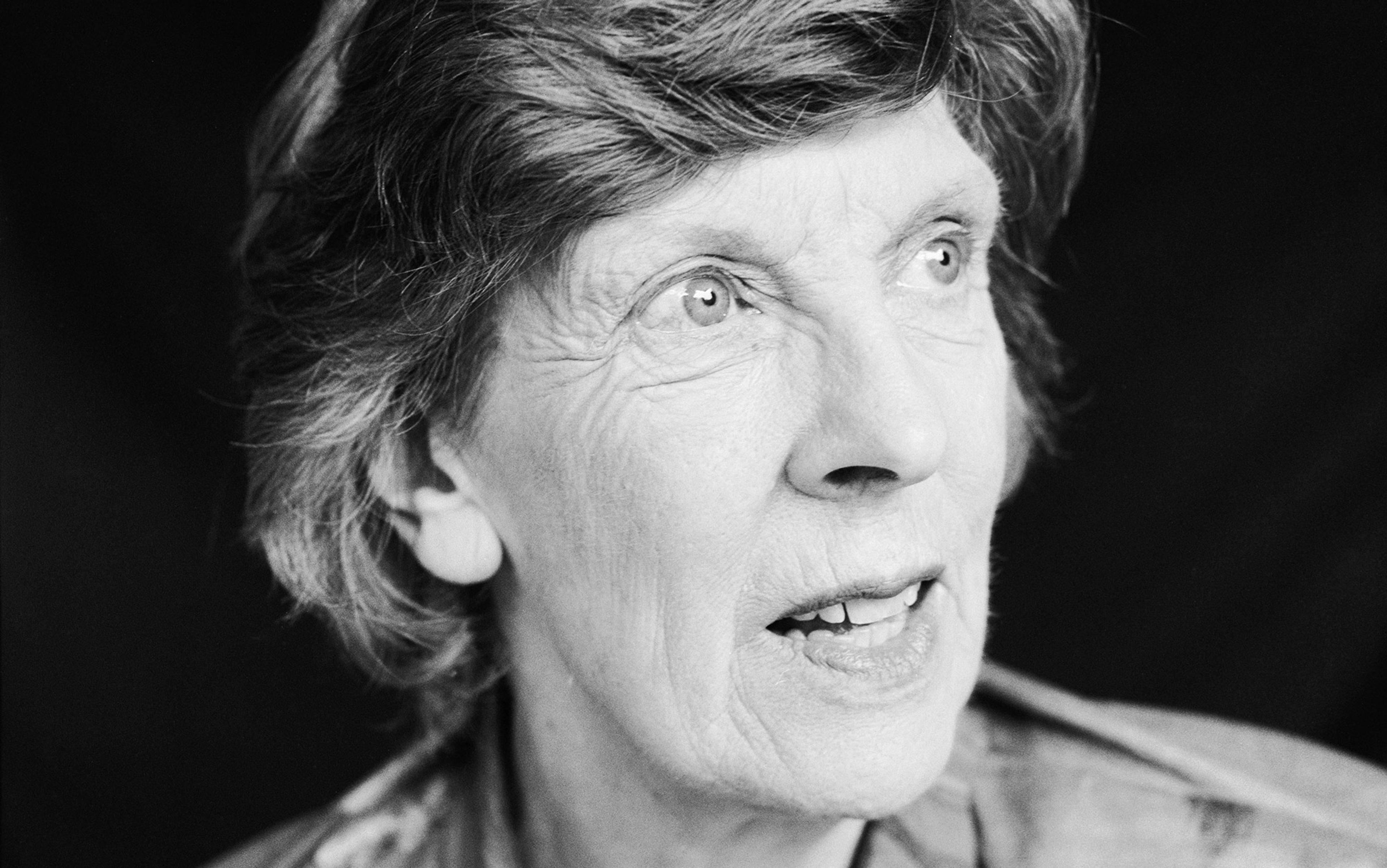A couple of years ago, the idea of God came up, in an incidental way, in the Contemporary Moral Theory course I teach. I generally try not to reveal my particular beliefs and commitments too early in the semester, but since it was late in the course, I felt I could be open with the students about my lack of religious belief. I will never forget the horrified look on one student’s face. ‘But Professor Jollimore,’ he stammered, ‘how can you not believe in God? You teach ethics for a living!’
I shouldn’t have been surprised by this reaction. But I always am. We were 12 weeks into a class that discussed a great variety of recent moral theories, none of which made the slightest reference to any sort of divine power or authority, but this made no difference. After 20 years of living in the US (I was born in Canada), I still tend to forget how many people here assume, simply as a matter of common sense, that the very idea of ‘secular ethics’ is an abomination, a contradiction, or both.
I don’t want to suggest that this attitude is influential only in the US. It is simply more prominent here. In polls and studies, a majority of Americans don’t trust atheists and say they would not vote for a presidential candidate who did not believe in God. ‘Religion’ and ‘theology’ are still frequently cited in the American media as if they were the sole aspects of human existence responsible for matters of value. ‘We need science to tell us the way things are; we need religion to tell us the way things ought to be,’ as people around here like to say. I have spent my career studying the way things ‘ought to be’, outside of the scaffolding of any faith or religious tradition. No wonder I find such sentiments rather frustrating.
More than that, I find them perplexing. Perhaps it seems natural for a person who was brought up in a religious tradition to place their personal moral views in a framework of faith. But I’m skeptical whether religion can provide genuine knowledge of any sort — and I can’t help noticing the level of disagreement and difference that still exists, sometimes violently, between believers of different faiths. Given this, I find it dubious that we can, let alone must, go to religion if we want knowledge about how to live. The fact that ethical commitments, in some people’s lives, find a natural place in the context of religion does not imply that such commitments can only be grounded and motivated in religion, nor that a universe can only contain morality if it also contains God.
Moreover, when actual arguments (not just good plain ‘common sense’) are offered against the possibility of secular morality, they tend to be deeply unconvincing. One common argument is that if there is no God, moral views are merely subjective opinions and nothing more: God is said to be required to make morality objective. A second argument is that divine authority is necessary to give morality its motivational force: without the threat of reward or punishment hanging over them, people will supposedly murder, rape, rob, and in every other way give in to their inherently sinful natures.
Neither of these arguments should persuade us. Let’s take the second: that if there were no God to punish bad behavior, people would run wild, robbing, raping, and murdering. This claim is pretty easy to prove false. After all, there are plenty of people in this world who don’t believe in God but nor do they behave like sociopaths. Of course, one might reply that such atheists are confused: given that they don’t believe in divine punishment, they should act like sociopaths, whether they realise it or not. But this is both uncharitable and inaccurate. What explains their behavior is not logical error, but rather the belief — which they share with pretty much all non-sociopaths, including religious believers — that there are plenty of good reasons for doing things that are not in one’s own self-interest.
The idea that murdering innocent people is perfectly fine unless there is a God and he disapproves is not only deeply implausible, but positively immoral
The first argument — that without God, moral opinions would be entirely subjective — is also flawed. The classic response to this argument is known as ‘the Euthyphro dilemma,’ after the Socratic dialogue in which Plato first presented the argument. Suppose — as we presumably all believe — that killing an innocent person on a whim is morally wrong. Since it’s wrong, God, if he exists, surely disapproves of it. Now, is this action wrong because God disapproves of it, or does he disapprove of it because it’s wrong? The first option is unattractive for a number of reasons. It makes God seem arbitrary: if there really isn’t anything wrong with murder in itself, prior to God’s disapproving of it, then he might just as well have disapproved of wearing white socks after Labor Day. And if God’s moral rules are arbitrary in this way, then why is it important to follow them? Besides, it seems not only implausible but downright nasty to think that there is nothing wrong with murdering an innocent human being other than the fact that a very powerful observer disapproves of it — as if irritating or upsetting God were more important than the harm done to the innocent victim. The second option, then, is to be preferred: God disapproves of murder because murder is wrong — which implies that murder is wrong in itself, and so doesn’t need God’s disapproval to make it wrong.
The basic point in both cases is simple, but profoundly significant: if there isn’t already objective morality in the world, it isn’t at all clear how adding God to the picture would bring such a morality into existence. Adding God would give us divine rewards and punishments, but that’s only to add self-interested reasons to be ethical, not genuinely moral reasons. Similarly, adding God gives us a divine observer who can disapprove of murder and other wrong actions; but unless these actions are already morally wrong, it’s not at all apparent how God’s existence would magically transform them from permissible to forbidden. The idea that murdering innocent people is perfectly fine unless there is a God and he disapproves is not only deeply implausible, but positively immoral in its own right. To think such a thing is, in my view, a kind of moral failing in itself.
We are left, then, with a bit of a mystery: why do so many people believe that morality needs to be grounded in religion, when the arguments in favour of that view are so unconvincing? I suspect that something else is going on, and that in most cases these arguments are just rationalisations for the belief that morality depends on faith in God. The actual explanation, I believe, is something else.
The reality is, no system of secular ethics has managed to displace religious approaches to ethics in the contemporary popular imagination. It is worth asking why. We can start with the fact that the secular approaches that have dominated Western thought since the Enlightenment tend to share certain features. The two most significant post-Enlightenment secular theories are those derived from the work of the Prussian philosopher Immanuel Kant, and utilitarianism, which originates in the work of the British philosophers Jeremy Bentham, James Mill, and John Stuart Mill.
Utilitarian ethics claims that the right thing to do is always the one that will maximise happiness or well-being among the general population. The answers to our moral questions are, thus, to be determined by empirical research — what will make people happiest or best-off, on the whole? Kantian ethics — to put a highly complex theory into a very small nutshell — says that reason commands us to behave morally. Moral truths are, in essence, logical truths, so that the content of morality can and ought to be determined from the philosopher’s armchair.
Many religious believers feel skeptical about modern secular ethics because they cannot see any possibility for this sort of integration between theory and experience, between moral principles and how life is actually lived
Kantian and utilitarian approaches have been both fruitful and influential, and they get a lot of things right. But they share an impersonal, somewhat bureaucratic conception of the human being as a moral agent. The traits that are most highly prized in such agents are logical thinking, calculation, and obedience to the rules. Personal qualities such as individual judgment, idiosyncratic projects and desires, personal commitments and relationships, and feelings and emotions are regarded as largely irrelevant. Indeed, Kant argued that actions that were motivated by emotions — acts of kindness performed out of compassion, for instance — had no moral worth; a worthy action was one motivated simply by the logical judgment that it was the morally correct thing to do. For utilitarians, meanwhile, each moral agent is only one among a great multitude, and the kind of impartiality the theory demands prevents the individual from giving personal emotions or desires any special consideration. A person’s feelings, preferences and commitments are supposed to play almost no role in decision-making.
This is in stark contrast to most religions, which tend to preserve the deep connection between the ethical and the personal. This is true even in those religious traditions that emphasise obedience to God’s will; the moral view of the Old Testament, for instance. And the connection is further emphasised in many streams of both Christianity and Buddhism, which place great emphasis on the cultivation of the virtuous personality and on moral emotions including love and compassion. When I talk with religious believers about their faith and their morals, I am struck by how closely and deeply connected both their faith and their morality tend to be to their deepest personal concerns, how richly interwoven these things are into the general fabric of their lives.
Many religious believers feel skeptical about modern secular ethics in part because they cannot see any possibility for this sort of integration between theory and experience, between moral principles and how life is actually lived. Such theories neglect the personal: they privilege rationality over emotion, the abstract over the particular, obedience to rules over individual judgment. And, on the whole, they have had little to say — and have sometimes actively resisted having anything to say — about such old-fashioned notions as character and virtue.
That’s the bad news for secular ethics. The good news is that this somewhat negative assessment of its strengths and satisfactions is based on a limited historical perspective. The dominant secular theories of ethics since the Enlightenment might be largely guilty of neglecting the personal — but there are exceptions. Theorists such as Samuel Butler and David Hume, for instance, saw moral character and virtue as significant, and John Stuart Mill attempted to make a place for it within his utilitarian system, as have some contemporary utilitarians. And in any case, there are other places to look for an ethics beyond religion, both more recently and in the distant past. Indeed, to my mind the most interesting work in secular ethics has been done by people whose project is inspired by and rooted in the distant past — and in particular, by the philosophers of ancient Greece.
Two central figures here are Iris Murdoch, especially her book The Sovereignty of Good (1970), and John McDowell, professor of philosophy at the University of Pittsburgh, and in particular his influential paper ‘Virtue and Reason’ (1979). In addition to being a philosopher, Murdoch was of course a magnificent novelist, and this fact is not incidental. For Murdoch, the most crucial moral virtue was a kind of attentiveness to detail, a wise, trained capacity for vision, which could see what was really going on in a situation and respond accordingly. The sort of psychological insight and attentiveness to detail necessary for writing fiction was also, for Murdoch, what enables a person to live a morally good life. ‘It is obvious here,’ she wrote, ‘what is the role, for the artist or spectator, of exactness and good vision: unsentimental, detached, unselfish, objective attention. It is also clear that in moral situations a similar exactness is called for.’
Ethics is built not on a system of rules, but on individual human beings who possess character, judgment, and wisdom
For Murdoch, what so often keeps us from acting morally is not that we fail to follow the moral rules that tell us how to act; rather, it is that we misunderstand the situation before us. When we describe the situation to ourselves, we simply get it wrong. To get the description right — to accurately grasp the nature of the motivations at play, to see the relevant individuals in their wholeness and particularity, and to see what, morally speaking, is at stake — is to grasp the ‘shape’ of the situation, in the words of Jonathan Dancy, professor of philosophy at the University of Texas at Austin. It is to see things in the right way, from the proper angle, and with the correct emphasis. Once this is achieved, according to Murdoch and Dancy, it will be apparent what needs to be done, and the motivation to do so will follow naturally. Faced with a situation that demands compassion, the virtuous person responds, spontaneously, with compassion; she doesn’t need to reason herself into it. As Dancy once described it, to give one’s justifications for responding in a certain way ‘is just to lay out how one sees the situation … The persuasiveness here is the persuasiveness of narrative: an internal coherence in the account which compels assent. We succeed in our aim when our story sounds right.’ Murdoch the novelist would have approved.
This emphasis on being attentive to concrete reality tallies with the idea that it is the emotions (compassion and sympathy in particular), rather than abstract rational principles, that are doing the motivating when it comes to ethical behaviour. Together they embody a critique of moral views, such as Kant’s, which rely on inflexible ethical principles allegedly derived from logic itself. In the work of McDowell, this critique is developed into a position called ‘moral particularism’, which rejects altogether the idea that we might one day compose or possess an ethical rulebook that would define the right thing to do in any conceivable situation. After all, what can count as a moral reason in one context might fail to be a reason in another, or might even be, in certain contexts, a reason pointing in the other direction.
Take happiness as an example. For the classical utilitarian, the fact that something increases happiness is always a reason to do it. But the particularist will point out that in the real world things are more complicated: the enjoyment of the sadist, for instance, is actually a further argument against an act of cruelty, not an argument in favor of it, or even a consideration that mitigates its badness. Conversely, refusing to make someone happy is sometimes morally right, as in cases of ‘tough love’: sometimes, as the Nick Lowe song has it, one must be cruel to be kind. To see that a person who appears to be acting cruelly is actually motivated by kindness, and indeed is being genuinely kind, is to grasp the correct shape of the situation, to latch onto the accurate description. And this accurate perception, again, tells us what we need to do to respond properly: it conveys what the situation demands, for, on the particularist view, these demands are quite literally part of the situation itself.
Indeed, happiness is complicated in other ways as well, many of which are beginning to be articulated by psychologists and other happiness researchers. Early utilitarians such as Bentham held a very simple view of happiness, equating it with pleasure and assuming it was a unitary substance that could be empirically and objectively measured. However, more recent investigators tend to prefer a picture in which several distinct and perhaps incommensurable factors make contributions to a person’s happiness. This fits in well with the particularists’ view that evaluation is always a holistic matter. It is worth remembering, too, that Aristotle understood eudaimonia, which is frequently translated into English as ‘happiness’, as something considerably broader and less subjective than pleasure or momentary satisfaction. Instead, it has to do with the general quality of one’s life as a whole.
For particularists, then, individual perception and judgment are always necessary to decide difficult ethical questions: there is no theoretical ethical system that can do the work for us. Principles are useful, perhaps, but only as rules of thumb, practical guidelines that hold for the most part, but to which there will always be exceptions. At the foundational level, ethics is built not on a system of rules, but on individual human beings who possess character, judgment, and wisdom.
Particularism re-opens the door to the idea of wisdom. It is an idea that Kantian and utilitarian ethics — and, for that matter, the modern world in general — have great trouble taking seriously. Wisdom, as opposed to knowledge, might seem a somewhat quaint notion in the contemporary world. (Indeed at this point even the word ‘knowledge’ sounds quaint to many people, who prefer to talk about ‘data’ or ‘information.’) The modern desire to replace individual wisdom and judgment with more objective, scientific methods of decision-making and evaluation has had profound effects on many aspects of our lives. In the field of education, where I work, it has led to ever-increasingly complex systems of rules and standards for professional conduct, for assessing teaching effectiveness, for making promotion decisions, even for designing courses and course curricula. The prevailing attitude is that we need a system of rules and principles to make and justify every decision, because we cannot trust the individuals involved enough to leave it up to their good judgment — even when the individuals involved are highly trained experts and just the sort of people capable of discerning how rules and principles should be implemented, and when they should be ignored or adapted. Similarly, the current plague of standardised testing inflicted on students leads to the slighting of skills and traits that are difficult to quantify: artistic talents, creativity, and moral attributes, among many others. This prevailing attitude is one that many Kantians and utilitarians would applaud, and one that Aristotle would deplore.
For Aristotle, ‘practical wisdom’ meant the kind of sophisticated and judicious individual judgment that is necessary to deal with the world’s moral complexity. The virtuous person is the person who is capable of judging well, and on this sort of view the only possible definition of moral rightness makes explicit reference to such a person. Since there is no set of rules that dictates right action in all situations, we can only say that the right thing is what the ideally wise and virtuous person would do. ‘Actions, then,’ Aristotle taught, ‘are called just and temperate when they are such as the just or the temperate man would do; but it is not the man who does these that is just and temperate, but the man who also does them as just and temperate men do them.’ Even if a set of rules could pick out the right action in every situation — something Aristotle denies — we would still need individuals possessed of great practical wisdom to understand why the right action in any given case is the right one, to know with what attitude it ought to be performed, to know precisely what motive should be lying behind the action and prompting us to act. (Morally speaking, an act performed out of self-interest is not necessarily the same as one performed out of compassion or loyalty, even if they all look precisely the same from the outside.)
Given this, it is not surprising that on Aristotle’s view the cultivation of virtue and wisdom — the development of one’s own moral character and powers of judgment — is all-important. Developing practical wisdom is, for Aristotle, a matter both of acquiring knowledge and experience and of training one’s responses, including the emotions. We begin by imitating the virtuous, and end up becoming virtuous ourselves. ‘The things we have to learn before we can do,’ he taught, ‘we learn by doing, for example men become builders by building and lyre-players by playing the lyre; so too we become just by doing just acts, temperate by doing temperate acts, brave by doing brave acts.’ Since much of the formative work happens in the first years of life, early childhood education and training is of vast importance. ‘It makes no small difference, then, whether we form habits of one kind or another from our very youth,’ he tells us. ‘It makes a very great difference, or rather all the difference.’
Altruistic feelings and behavior, it appears, really do have substantial psychological benefits
This then is a secular ethics that emphasises the significance of self-cultivation, individual judgment, and emotions such as compassion, as well as recognising the usefulness of moral exemplars — teachers who are paradigms of wisdom, who inspire us and whom we can try to imitate. It is a secular ethics that shares some important common ground with religious tradition. The idea that morality stems from strong character rather than from obedience to a strict set of rules, for instance, is very much in line with the moral reorientation proposed by Christ in the New Testament, from a view centered on obedience to God’s commandments to one in which love and compassion take centre stage.
This reorientation has also been identified as desirable by some Buddhists. In his book about secular ethics, Beyond Religion (2011), the Dalai Lama writes that, in his view, ‘ethics consists less of rules to be obeyed than of principles of inner self-regulation to promote those aspects of our nature which we recognise as conducive to our own well-being and that of others’. Indeed, the Dalai Lama’s description of moral deliberation contains several elements that are recognisable from Murdoch, McDowell, and even Aristotle:
[W]hen called upon to make a difficult decision, I always start by checking my motivation. Do I truly have others’ well-being at heart? Am I under the sway of any disturbing emotions, such as anger, impatience, or hostility? Having determined that my motivation is sound, I then look carefully at the situation in context…. So while I encourage the reader to internalise a personal value system, it would be unrealistic to suppose that matters of ethics can be determined purely on the basis of rules and precepts. Matters of ethics are often not black and white. After checking to be sure that we are motivated by concern for the welfare of humanity, we must weigh the pros and cons of the various paths open to us and then let ourselves be guided by a natural sense of responsibility. This, essentially, is what it means to be wise.
Another attractive feature of neo-Aristotelian particularism — and one that, like its emphasis on clear-sightedness and individual judgment, also establishes a kind of link with some religious approaches — is found in its conception of the virtues. On many traditional accounts, virtues are held not only to be desirable from an external standpoint; they are also thought to be good for the person who exhibits them. In the long run, the wise, the honest, the courageous, the compassionate will live fuller lives, and be happier, than the unwise, the dishonest, the cowardly, and the coldhearted. Ethical perception and action contribute to human flourishing, not only the flourishing of others but one’s own as well. Since, on Aristotle’s account, one’s own flourishing is enhanced by virtuous action, there is good reason to be ethical; but the rewards and penalties are largely internal rather than externally imposed.
Moreover, the Aristotelian claim that morality is good for us actually turns out to be supported by psychological research. There is mounting empirical evidence that people who cultivate their ability to feel compassion for others, and who engage in projects that express altruistic commitments, tend to be more relaxed, more fulfilled, and happier. Altruistic feelings and behavior, it appears, really do have substantial psychological benefits. The ancient Greeks might have been on to something when they said that the virtues were those character traits that were good both for the person who possessed them and for society at large.
In a similar way, much contemporary scientific research also supports the Aristotelian idea that rather than seeing emotions as mere drives or urges, we should see them in some ways as analogous to beliefs: mental states that reflect and hence inform us about the world. Although the contrast between reason and the emotions, like the distinction between fact and value, is a deep assumption in most post-Enlightenment scientific thinking — and one that lay at the root of the positivism that ruled by science and philosophy for most of the 20th century — the more recent trend among many scientists, as well as philosophers, is to complicate if not deny the distinction. For example, Antonio Damasio, professor of neuroscience at the University of Southern California, argues in Descartes’ Error (1994) that there are close and complicated relations between emotions, physiological states, and rational thought. And it is largely because of particularism’s refusal to relegate emotions to the realm of the deeply irrational that it is able to capture the moral importance of the emotions in a way that Kantianism, utilitarianism and various other secular moral theories are unable to do.
Admittedly, it is a bit of a simplification to speak of ‘particularism’ as if that word picked out a single, unified, definitive theory. The philosophers who have held views of this sort have significant disagreements with one another. They are, after all, philosophers; having disagreements with other philosophers is their job. What’s more, there are still a lot of questions to be answered and bugs to be worked out. But as a general way of thinking about morality, this approach seems promising, and indeed exciting. It captures many significant aspects of the moral life that have traditionally been more emphasised in religious rather than in secular ethics, without needing to make an appeal to a divine authority, to the existence of God, or to anything recognisably supernatural.
If for nothing else, particularism is valuable as a reminder of the possibility that we might one day teach ourselves to stop looking at morality as an abstract and isolated set of requirements and demands — an external authority that stands apart from and sets limits on human existence — and see it instead as a set of commitments, enthusiasms, and passions that are woven into the very fabric of our lives. Morality can get along just fine without God. But it cannot possibly get by if it neglects and ignores the very things that make human life meaningful and precious.






